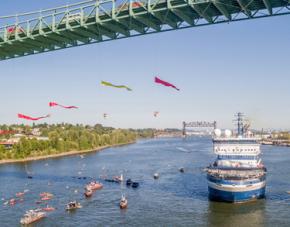Saying “Shell no” to Arctic drilling
reports on the fight in Portland, Oregon, to keep Shell from expanding its Arctic drilling operations.
THIRTEEN CLIMBERS repelled off the St. John's Bridge in Portland late last month, hanging just above the water, as part of an action to prevent Shell Oil's icebreaker from leaving dry dock where it would travel to the Arctic as part of the company's oil drilling operations. Hundreds of people along the shore cheered when the Fennica turned around and headed back to the dock, as dozens of protesters in kayaks swarmed the Willamette River below the bridge.
In response to a civil suit filed against protesters by Royal Dutch Shell, a federal judge in Alaska ordered Greenpeace USA to pay a fine of $2,500 for every hour that protesters blocked the ship. The blockade lasted 40 hours, being broken up by authorities in the late afternoon of July 30.
Portland Mayor Charlie Hales has expressed his commitment to fighting climate change, but despite the fact that the only disruption by the protesters was to Shell's massive profits, the mayor sided with the fossil fuel extractors against the sentiments of the overwhelming majority of Portland's residents. After expressing sympathy for the activists' cause, Hales ordered police and firefighters to remove the climbers--allowing the ship to depart. Despite this, environmental activists say the protest was an important part of the fight against Arctic drilling and climate change.

Prior to the protesters' removal, Annie Leonard, the executive director of Greenpeace USA, said in a statement:
Every second we stop Shell counts. The brave climbers here in Portland are now what stand between Shell and Arctic oil. This is President Obama's last chance to wake up and realize the disaster that could happen on his watch. There is still time for our president to cancel Shell's lease to drill in the Arctic...Shell has ignored the world's best scientists, as well as millions of people around the world, who have all said repeatedly that the melting Arctic is a dire warning, not an invitation.
The Shell-contracted Fennica had been in Portland for repairs to a meter-long gash in its hull after it was damaged off the coast of Dutch Harbor. In late July, the Obama administration released a decision requiring the Fennica and its capping stack, a critical piece of Shell's drilling fleet, to be fully repaired and on the drill site before the company can drill deep enough for oil. Shell must also reapply to federal regulators for specific drill permits, which are not guaranteed.
"Greenpeace prioritizes safety above all else--rappelling from a bridge is a walk in the park compared to the risks that we'll face if we continue the climate change trajectory we're on now," Leonard said.
SINCE SHELL'S drilling fleet arrived in the Seattle area and then began moving north to the drill site, a broad movement against their drilling has emerged in the Pacific Northwest and extending to Alaska. In June, activists in kayaks--dubbed "kayactivists"--formed a blockade around Shell's drilling rig, the 40,000 ton Polar Pioneer, as it left Seattle en route to Alaska.
In May, the Obama administration approved Shell's plan to drill for oil in the Chukchi Sea in the Alaskan Arctic. Since that approval, both Shell's rigs, the Polar Pioneer and the Noble Discoverer have failed routine inspections. In an environmental analysis, the Obama administration predicts a 75 percent chance of a major oil spill if Shell develops its leases in the Chukchi Sea.
While this amazing action has focused world attention on Obama's decision to allow drilling in the Arctic and has inspired local activists and everyday Portlanders to turnout and even to get out in the water in a kayak, there unfortunately didn't seem to be much effort by Greenpeace to organize rallies, speak-outs or teach-ins about climate change or what it will take to stop it. Although heroic, the danger with such relying only on such protest actions is that regular people can end up depending on the bravery of a few committed activists, rather than building the kind of grassroots, large-scale movement needed to really disrupt the fossil fuel industry.
On a positive note, the day after the blockade was broken, local groups--including the Sierra Club, Rising Tide, 350.org and Climate Action Coalition--organized a rally of several hundred people on the river to thank the Greenpeace climbers and to talk about next steps. Pointing to the growing understanding among Portlanders that our city is a central point for the transporting of fossil fuels and to recent mobilizations that disrupted the construction of a propane terminal, protesters chanted "Coal, oil, gas: None shall pass," and vowed to step up agitation, organizing and mass action against the hydrocarbon profiteers.


